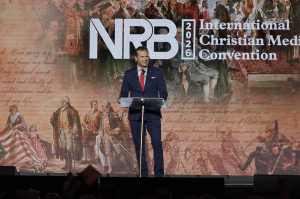What is the New Apostolic Reformation and is it 'dangerous'?

Is the New Apostolic Reformation a “false movement?”
Two Christian apologists say the popular movement is leading Christians astray.
Acknowledging that the topic is divisive and sparks debates among believers, apologist Jason Jimenez, host of the "Challenging Conversations" podcast, unwrapped what the movement entails in an interview with Douglas Geivett, professor at Biola University and Talbot School of Theology, and Holly Pivec, a blogger and speaker on the topic. They co-wrote a book about the “harmful impacts” of the NAR movement, titled Counterfeit Kingdom: The Dangers of New Revelation, New Prophets, and New Age Practices in the Church.
Many Pentecostals and Charismatics are concerned about this movement, Pivec said, because these are not historic teachings. "They're not just promoting the miraculous gifts, they're actually promoting the offices of apostle and prophet — these authoritative offices that all others are supposed to submit to." She added that while many people who adhere to these beliefs might not be familiar with the term NAR, if they "believe there are governing, authoritative apostles and prophets today," they are part of the movement.
Geivett and Pivec's book defines NAR as a “popular and fast-growing new [global] movement of Christians who emphasize signs and wonders, and teach that God is giving new revelation through new apostles and prophets” and all believers, including pastors, must submit to their authority.
“The leaders in this movement will say that they're leading a reformation that is as great as or even greater than the Protestant Reformation. So, they're really trying to change the Church,” Pivec said, stressing that the movement is "harmful" and can lead people to abandon their faith when prophecies don't come to pass or physical healing fails to materialize.
Geivett said that their book is not a critique of Pentecostalism or Charismatic theology, nor is it a debate between cessationists or continuationists. "Our concerns are about other matters that are extreme features of NAR."
Speaking more about the so-called new offices of apostles and prophets, Pivec added, “Those who do submit to their authority will basically be part of this entire movement that will bring God's kingdom to Earth. And those who don't submit to their authority will sit on the sidelines as mere spectators.” And their revelations will equip “every Christian to develop miraculous powers such as: healing the sick, raising the dead [and] working even greater miracles than Jesus worked.”
Pivec argues that these apostles and prophets will perpetuate the idea that they have special interpretive abilities when it comes to reading Scripture that others do not possess. As a result, she said, the apostles and prophets will tell those who are not in their positions to seek them in order to receive messages or prophecies from God that only they can access.
“We've received letters from people around the world sharing stories of the harm they've experienced as far as split churches, split families, disillusionment with the Christian faith,” Pivec explained.
In their book, Geivett and Pivec discuss concerns they have with NAR. One such issue they tackle is false prophecies and what they call “fortune cookie prophecies.”
“We have a chapter in which we discuss the prophetic component of NAR. And we talk about different categories of prophecies or kinds of prophecies that you're to look for so that you know how to determine whether they count as reliable prophecies or not. And fortune cookie prophecies read rather like fortune cookies,” Geivett explained.
“The fortunes inside fortune cookies [are] very general. They're very open-ended and they have broad applications. And they're meant to be that way so that you can claim that your prophecy was fulfilled because you say it in such a generic way that it would be easy for the circumstances to be realized.”
Another type of false prophecy is what Pivec described as “fails” or “predictive prophecies,” which is when someone attempts to predict the future but it never comes to fruition.
“These are prophecies that just proved to be predictions that proved to be flat-out wrong. For example, dozens of prophets in this movement prophesied back in 2020 that President Trump would be re-elected to a second consecutive term in office back then,” Pivec explained. “Or many prophets were prophesying that there would be this quick end to COVID, that it wouldn't become a global pandemic [and] that it would just … kind of fizzle out really early on. And of course, that didn't happen.”
Pivec said that many times when the prophecies made by NAR prophets do not occur, they will often come up with reasons why.
“They always have reasons. Maybe ‘enough people didn't make enough prayer declarations for the prophecy to happen.’ Or ‘they didn't know there was something else they had to do in order for the prophecy to be fulfilled,’” she said.
Another form of false prophecies made by NAR leaders, Pivec said, are “fraudulent prophecies.”
“These are prophecies where prophets will make what appear to be predictions. But really, it could be something anyone can pretty much figure out by reading the news headlines,” Pivec said. “In some cases, … it appears that some prophets may actually be engaging in hot reading, which is really the practice of when someone will claim to make predictions but they've done some research beforehand,” she continued.
“For example, they researched the people who will be attending a meeting, find out details about someone's life and then act like God gave them that information in the moment when really they had done research ahead of time on Facebook or social media and found out information about that.”
While Pivec and Geivett are critical of the NAR movement, other Christian thought leaders have pushed back on arguments presented in their book and say there is nothing to be concerned about.
Michael Brown, host of the nationally syndicated "Line of Fire" radio program, wrote in an op-ed piece titled "Dispelling the Myths About NAR (the New Apostolic Reformation)" that what critics of NAR have raised their voices about “doesn’t exist" because it's "a myth."
Brown asserted that while Pivec and Geivett were “sincere in their writing and sought to do solid research,” their book “painted a very negative picture.”
“In the end, we are left with a totally ambiguous picture of what NAR actually is, making it all the more dangerous in the minds of the conspiratorial critics, who inevitably believe the worst,” Brown wrote.
“Just look at Holly's website where she tells you how to identify a NAR church and tell me if it's clear to you. Even after a two-hour dialogue with Doug and Holly, I'm still not certain as to how they identify NAR leaders or churches."
Listen to the 'Challenging Conversations Podcast' on the Edifi Podcast Network
“In short, what the critics have basically done is take whatever trends they differ within the worldwide Pentecostal-Charismatic movement, group them all together, and put them under the heading of NAR — even though this is not what NAR has ever meant. So, they have taken a term that had a specific meaning for years, put their own definition on it, and then decided who is part of it, regardless of how the facts line up.”
In response to Brown, the two authors co-wrote an op-ed piece for The Christian Post titled, "Michael Brown's NAR Straw Man: Is the New Apostolic Reformation Just a Conspiracy Theory or Something More?" saying "Brown ... likens critics' concerns about NAR to wild-eyed concerns about the Illuminati."
"And he explains how he's spent much time, in recent months, debunking what he calls the 'myth of NAR.' But in his attempt to set the record straight, Brown got it wrong," they wrote. "His article contains a good deal of its own misinformation, including a careless assessment of key sources.”
The authors stress that NAR teachings are "entering the mainstream" and differ from " classical Pentecostalism and from the historic teachings of charismatics."
"So it's important for all Christians to get up to speed on this movement," Geivett and Pivec wrote.
Nicole Alcindor is a reporter for The Christian Post. She can be reached at: nicole.alcindor@christianpost.com.



























